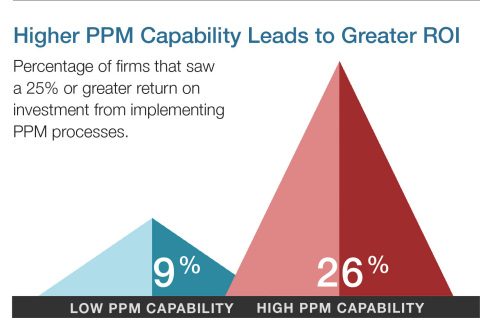GLEN MILLS, Pa.--(BUSINESS WIRE)--Project portfolio management is becoming a fixture in most organizations. And the PPM capability of firms is increasing as is PPM’s value to the firm. According to PM Solutions’ benchmark study on the “The State of the Project Portfolio Management (PPM) 2013,” 71 percent of firms have a PPM process in place, up from 64 percent in 2003. Of the firms without PPM in place, 52 percent say they plan to implement PPM processes within the year. This growth reflects PPM’s rising importance to organizations.
PM Solutions surveyed 495 high-level project management personnel from large, mid-sized, and small firms in various industries from around the world, including finance and insurance, manufacturing, healthcare, professional services, and government. The primary purpose of the study was to gain a clearer understanding of current PPM practices, challenges, and trends that will lead to improved PPM success.
What distinguishes organizations with highly capable PPM processes: They are far more likely to realize a broad range of benefits from PPM including improvements in resource allocation, customer satisfaction, strategy execution, cost savings, and time-to-market. They are more likely to have been using project portfolio management for a considerably longer period of time. They are more likely to track the ROI of PPM and find a strong financial argument in favor of continued PPM improvements. They engage in significantly more PPM functions. They are more likely to offer PPM-related training to their employees. And they are more likely to practice PPM across the enterprise, broadening its reach to encompass all of the enterprise’s work.
“These findings are consistent with what we’ve experienced in our PPM consulting engagements,” said J. Kent Crawford, PMP, CEO of PM Solutions and former president and chair of the Project Management Institute (PMI®). “For many firms, PPM may already exist, but in disparate parts. PM Solutions has helped several firms improve upon and consolidate PPM practices under a singular approach that mitigates risks to the organization and delivers a return on business expectations.”
The full report, now available at www.pmsolutions.com/research, identifies four key predictions on the future of project portfolio management based on current trends:
- Organizations will increasingly find that the PMO is the best organizational entity to oversee PPM.
- Organizations will place an emphasis on PPM-related training, strengthening their PPM capability and helping them address their ever-present resource challenges.
- Improvements in PPM reporting and analytics will make it possible for organizations to get a grip on resource availability and skills data.
- For those firms starting with low or no PPM capability, the strategy of reaching out to consulting firms to help them implement PPM processes and overcome organizational change resistance will be the quickest way to catch up to the PPM leaders.
Additional findings suggest avenues for improvement as PPM continues to engage interest at the executive level. PM Solutions’ “State of the PMO 2012” research shows that firms no longer list lack of organizational support among the top three barriers to PPM implementation as they did a decade ago. Also there’s been a significant change in the frequency of portfolio review over the past decade reflecting the speed at which firms today need to respond to market drivers. But resource management headaches continue to plague organizations.
“The survey respondents listed resource management as their biggest pain point,” notes Crawford. “In particular they cited lack of information on resources and inadequate PPM skills as top challenges. That’s why we were encouraged to see that they also plan to address these challenges by improving their PPM processes and increasing their PPM-related training in 2013.”
About PM Solutions
PM Solutions is a project management services firm helping organizations apply project management, portfolio management, and PMO practices to improve business performance. For nearly 20 years, PM Solutions has been helping clients drive business value through improved PPM capability. Comprehensive offerings provided by PM Solutions include PPM process improvement, PMO transformation, program and project management resources, and corporate training and competency development delivered through its training division, PM College® (www.pmcollege.com). PM Solutions serves a diverse client base that includes some of the world’s leading organizations in industries such as manufacturing, IT, energy, insurance and financial services. For more information, visit www.pmsolutions.com.
Editors’ Note: All graphs and charts contained within the “The State of Project Portfolio Management (PPM) 2013” research report can be provided separately for sidebar use upon request.


